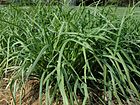Note: This is a project under development. The articles on this wiki are just being initiated and broadly incomplete. You can Help creating new pages.
Difference between revisions of "Allium tuberosum - Garlic chives"
| Line 1: | Line 1: | ||
| − | |||
| − | |||
[[File:Allium tuberosum2.jpg|thumb|right|''Garlic chives '', ''Allium tuberosum'']] | [[File:Allium tuberosum2.jpg|thumb|right|''Garlic chives '', ''Allium tuberosum'']] | ||
Revision as of 17:57, 2 July 2018
Allium tuberosum (garlic chives, Oriental garlic, Asian chives, Chinese chives, Chinese leek) is a species of onion native to southwestern parts of the Chinese province of Shanxi, and cultivated and naturalized elsewhere in Asia and around the world.
Contents
- 1 Uses
- 2 Parts Used
- 3 Chemical Composition
- 4 Common names
- 5 Properties
- 6 Habit
- 7 Identification
- 8 List of Ayurvedic medicine in which the herb is used
- 9 Where to get the saplings
- 10 Mode of Propagation
- 11 How to plant/cultivate
- 12 Commonly seen growing in areas
- 13 Photo Gallery
- 14 References
- 15 External Links
Uses
kidney problems, urinary incontinence, bladder weaknesses, Curing liver disorders, spermatorrhoea, cuts, wounds, snakebites.
Parts Used
Chemical Composition
Dipropyl disulfide, methyl pentyl disulfide, penthanethiol, penthyl-hydrodisulfid and cis/trans-3,5-diethyl-1,2,4-trithiolane[1]
Common names
| Language | Common name |
|---|---|
| Kannada | |
| Hindi | |
| Malayalam | |
| Tamil | |
| Telugu | |
| Marathi | NA |
| Gujarathi | NA |
| Punjabi | NA |
| Kashmiri | NA |
| Sanskrit | |
| English | Garlic chives, Chinese leeks |
Properties
Reference: Dravya - Substance, Rasa - Taste, Guna - Qualities, Veerya - Potency, Vipaka - Post-digesion effect, Karma - Pharmacological activity, Prabhava - Therepeutics.
Dravya
Rasa
Guna
Veerya
Vipaka
Karma
Prabhava
Habit
Identification
Leaf
| Kind | Shape | Feature |
|---|---|---|
| Simple | The leaves are divided into 3-6 toothed leaflets, with smaller leaflets in between |
Flower
| Type | Size | Color and composition | Stamen | More information |
|---|---|---|---|---|
| Unisexual | 2-4cm long | Yellow | 5-20 | Flowers Season is June - August |
Fruit
| Type | Size | Mass | Appearance | Seeds | More information |
|---|---|---|---|---|---|
| 7–10 mm (0.28–0.4 in.) long pome | clearly grooved lengthwise, Lowest hooked hairs aligned towards crown | With hooked hairs | {{{6}}} |
Other features
List of Ayurvedic medicine in which the herb is used
- Vishatinduka Taila as root juice extract
Where to get the saplings
Mode of Propagation
How to plant/cultivate
Landscape Uses:Border, Container, Ground cover, Rock garden. An easily grown plant[[2]
Commonly seen growing in areas
Tall grasslands, meadows, Borders of forests and fields.
Photo Gallery
References
External Links
- Ayurvedic Herbs known to be helpful to treat kidney problems
- Ayurvedic Herbs known to be helpful to treat urinary incontinence
- Ayurvedic Herbs known to be helpful to treat bladder weaknesses
- Ayurvedic Herbs known to be helpful to treat Curing liver disorders
- Ayurvedic Herbs known to be helpful to treat spermatorrhoea
- Ayurvedic Herbs known to be helpful to treat cuts
- Ayurvedic Herbs known to be helpful to treat wounds
- Ayurvedic Herbs known to be helpful to treat snakebites
- Herbs with Leaves used in medicine
- Herbs with Roots used in medicine
- Herbs with Flowers used in medicine
- Herbs with common name in English
- Habit - Bulb
- Index of Plants which can be propagated by Seeds
- Index of Plants which can be propagated by Cuttings
- Herbs that are commonly seen in the region of Tall grasslands
- Herbs that are commonly seen in the region of meadows
- Herbs that are commonly seen in the region of Borders of forests and fields
- Herbs





